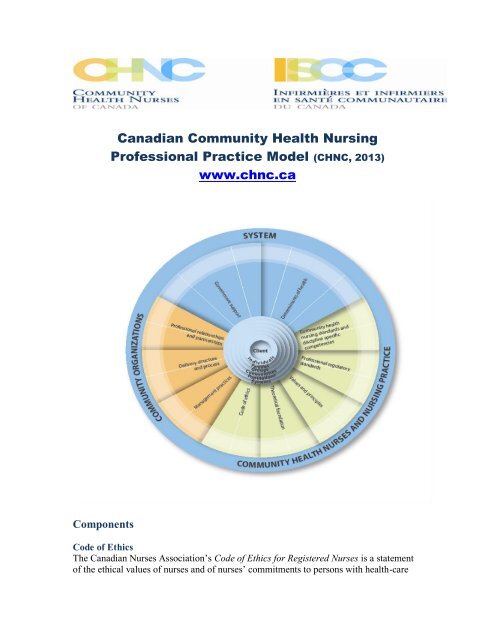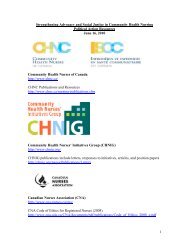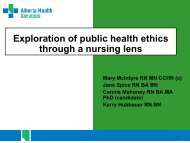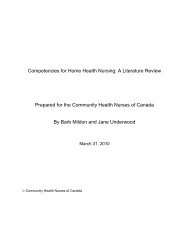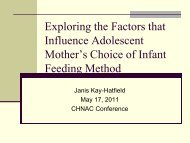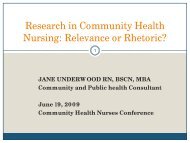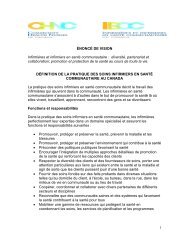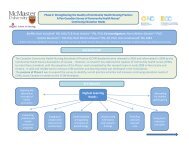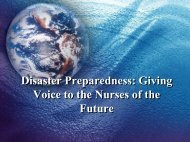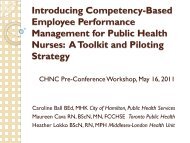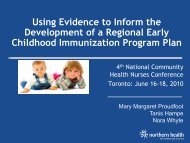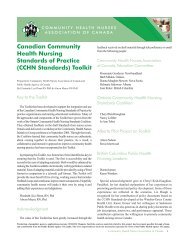Canadian Community Health Nursing Professional Practice Model ...
Canadian Community Health Nursing Professional Practice Model ...
Canadian Community Health Nursing Professional Practice Model ...
You also want an ePaper? Increase the reach of your titles
YUMPU automatically turns print PDFs into web optimized ePapers that Google loves.
<strong>Canadian</strong> <strong>Community</strong> <strong>Health</strong> <strong>Nursing</strong><strong>Professional</strong> <strong>Practice</strong> <strong>Model</strong> (CHNC, 2013)www.chnc.caComponentsCode of EthicsThe <strong>Canadian</strong> Nurses Association’s Code of Ethics for Registered Nurses is a statementof the ethical values of nurses and of nurses’ commitments to persons with health-care
needs and persons receiving care. It is intended for nurses in all contexts and domains ofnursing practice and at all levels of decision-making. It is developed by nurses for nursesand can assist nurses in practising ethically and working through ethical challenges thatarise in their practice with individuals, families, groups, communities, populations and systems.<strong>Professional</strong> Regulatory Standards<strong>Professional</strong> regulatory standards demonstrate to the public, government and otherstakeholders that a profession is dedicated to maintaining public trust and upholding thecriteria of its professional practice. (CNA Website)<strong>Community</strong> <strong>Health</strong> Nurse<strong>Community</strong> health nurses: View health as a resource for everyday living. Promote, protect and preserve the health of individuals, families, groups,communities, and populations in the settings where they live, work, learn,worship and play in an ongoing and/ or episodic process.1 Consider and address the impact of the social determinants of health within thepolitical, cultural and environmental context on health. Support capacity building focused on client strengths and client participation. Protect and enhance human dignity respecting social, cultural, and personalbeliefs and circumstances of their clients. Advocate and engage in political action and healthy public policy options tofacilitate healthy living. Incorporate the concepts of inclusiveness, equity and social justice as well as theprinciples of community development Participate in knowledge generation and knowledge translation, and integrateknowledge and multiple ways of knowing. Engage in evidence informed decision making. Work at a high level of autonomy. Have a personal commitment and accountability to professional practice with anemphasis on teamwork, collaboration, consultation and professionalrelationships.Values and PrinciplesValues are part of a collective belief system that underpins professional practice, informsthe development of educational programs2 and guides administration. <strong>Community</strong> healthnursing is rooted in caring3 and social justice as reflected in public policies such as theCanada <strong>Health</strong> Act4, the declaration of Alma Ata5, the Ottawa Charter for <strong>Health</strong>Promotion6, the Jakarta Declaration7, the Bangkok Charter for <strong>Health</strong> Promotion8 and the“Nairobi Call to Action”9 which are consistent with the <strong>Community</strong> <strong>Health</strong> Nurses ofCanada Vision Statement.10 The community health nursing is accountable, committed toquality care and competency through continuous professional development.Theoretical FoundationThe practice of community health nursing combines nursing theory and knowledge,social sciences and public health science with home health and primary health care
principles. The nursing metaparadigm includes: person (individuals, families,community, group, and populations), health, nursing, environment [culture] and socialjustice as central to the practice of community health nursing. 11,12Discipline Specific CompetenciesCompetencies are the integrated knowledge, skills, judgment and attributes required of aregistered nurse to practice safely and ethically. Attributes include, but are not limited toattitudes, values and beliefs.13,14<strong>Professional</strong> Relationships & Partnerships<strong>Professional</strong> relationships in community health nursing have an impact oncommunication, consultation, collaboration and forming effective partnerships withclients, team members other professionals as well as other sectors and organizations.15<strong>Community</strong> health nurses:• Recognize assets and capacity of people/partners in building collaborativepartnerships based on the principles of primary health care, caring, social justiceand empowerment.• Establish respectful, trusting relationships / partnerships with individuals,families, groups, communities, populations, and systems.• Ensure individuals, families, groups, communities, populations and systems areactive partners in defining their health issues and in making decisions that affecttheir health and well being• Build professional relationships and partnerships with colleagues, otherdisciplines, communities and sectors that support inter-professional collaboration.• Recognize socio-political and cultural influences that may impact relationshipand partnership building.Management <strong>Practice</strong>sManagement practices refer to the structure and processes for decision-making withincommunity organizations and agencies. An approach consistent with professional nursingvalues such as autonomy and accountability will support community health nurses topractice their full scope of skills and knowledge. Effective management practicespromote realization of the full potential of community health nursing resources with agoal of excellence in community health/public health nursing practice. Formalcommunication and decision making mechanisms are essential for effective communityhealth nursing professional practice. This involves having direct authority relating to“creating an environment that supports clinicians to incorporate evidence-based practice,maintain their competency and/or create systems and processes to enhance practice andprofessional development.”16 <strong>Community</strong> health nurses take personal and professionalsatisfaction from their contribution in promoting the health and well-being of individuals,families, groups, communities, populations and systems. <strong>Community</strong> health nurses valuea management approach that recognizes their contribution both informally and formally.Examples of rewards include but are not limited to: celebration of successes;certification; promotion and professional advancement or remuneration.Delivery Structure and Process
A variety of service delivery models that integrate <strong>Community</strong> <strong>Health</strong> <strong>Nursing</strong> Processinto practice are used in community health nursing including, but not limited to:generalist practice based on geographic location (e.g. neighbourhood nursing), focusedpractice (based on developmental stage or health issue (e.g. sexual health, post partum,wound care, shift nursing, palliative care), or care process (e.g. team nursing, primaryhealth care, case management or perhaps family centered care). <strong>Community</strong> healthnursing practice roles and activities are continually evolving to meet the health needs ofthe different population groups17, 18. Service delivery is focused onpreventive/curative/social aspects of care and is responsive to community needs and takesinto consideration stewardship of resources as an appropriate means of making servicesless costly, and more efficient and effective.<strong>Community</strong> <strong>Health</strong> <strong>Nursing</strong> StandardsA key characteristic of a self-regulating profession like nursing is the development ofstandards of practice based on the values of the profession. <strong>Practice</strong> standards describethe knowledge, skills, judgment and attitudes needed to practice nursing safely. Theyrepresent the desirable and achievable levels of performance expected of nurses in theirpractice and provide criteria for measuring actual performance (College of Nurses ofOntario, 2002)Government SupportProvision of community health nursing in Canada requires government resources andsupportive policies. Decisions about funded services, resources, performance standardsand policies that affect community well-being as well as the nursing profession all havean impact on the ability of community health nurses to deliver care consistent with theirprofessional standards. Consultation with the nursing community will assist governmentto make decisions that optimize health in the community.Social Determinants of <strong>Health</strong>The social determinants of health19, are the individual and collective factors andconditions affecting health status. The social determinants of health extend beyond thecommunity health nurses practice environment and scope of influence but impact onCHN practice because of their profound influence on the health of their clients(individuals, families, groups, communities, populations and systems). <strong>Community</strong> healthnurses support their clients by recognizing and identifying these factors as majorinfluences on health status and in advocating for positive means to address these issues.<strong>Health</strong> of Client (Individuals, Families, Groups, Communities, Populations,Systems)<strong>Community</strong> health nurses practice in health centres, homes, schools and other communitybased settings. Using a capacity building and strength-based approach, they provide,coordinate or facilitate direct care and link people to community resources. <strong>Community</strong>health nurses view health as a dynamic process of physical, mental, spiritual and socialwell-being. <strong>Health</strong> includes self-determination and a sense of connection to thecommunity. The practice of community health nursing community health nurses support
the health and well-being of individuals, families, groups , communities , populations andsystems.


